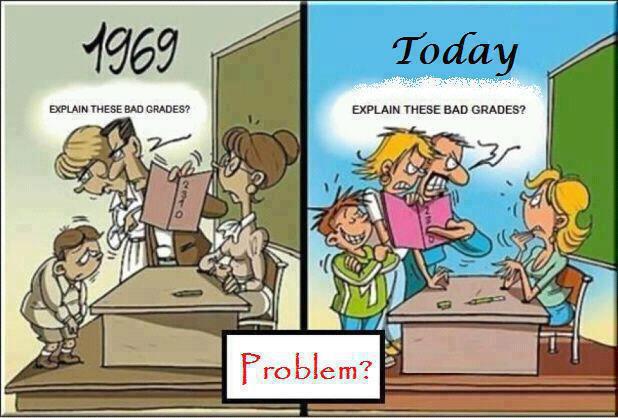Obviously that statement has a ton of different directions I could be taking this. I'm talking about the two emails I sent to my kid's teachers last week. Now school has been going on over nine weeks and this is the first time we've talked to them. And we initiated the communication. However, we initiated the conversation because of some small issues. In truth, we still haven't contacted his other teachers because we only call if he has a 'B.'
Obviously, my aggravation should be seen in light of my failure to get a job. But, I told myself in grad school that when I was a teacher I would contact. One reason is because the only calls my parents ever got from the school is when I had misbehaved. I hated that. I hate it now. My parents could have gotten a short call every time I got honor roll. School could have called to tell them that I was voted to be Key Club president and I wasn't even Catholic. But no. Do you think my wife got a call to tell her parents that she was top ten in her school? No.
I wanted to be different because if you need to have your student's parents increase their investment in their child's education then you would have to invest in your relationship. And in a lot of schools I know this is a changing principle in America. I know a lot of elementary school teachers contact parents every six weeks. I think that's great. I know that when I was in Korea I called all of my students twice every quarter and gave them a little over the phone quiz and then their Korean teacher would discuss these and other results with their parents. That was a lot, but it was private school. We were expected to be in closer contact. Public schools seem to be expecting more communication. One of those things that teachers are expected to do above and beyond teaching like discipline, life skills, nutrition, manners, phonics, and teamwork.
So how much communication is good enough? I think a short call to the parents once a six weeks and a form letter/news letter home every week to the family isn't asking a ton. Specific e-mails about strengths their students have would also be great. I've always dreamed about having a picnic at a park on a Saturday and inviting all my student's families. I like the idea of making the class/teacher relationship more communal and less professional. I feel like that's something we've lost.
Now, there is this meme/cartoon of the difference between education in the seventies and today. In one box the parents are standing with the teacher and yelling at the student, 'What are you going to do about these grades?' In the other box the same words are being shouted at the teacher by the parents. Have you seen that cartoon? Does that match your perception? Isn't this losing a professional respect for what the teacher does? Is this what's wrong with our educational system?

But wait didn't I say we've lost the communal to the more professional? Yes. I do think we've lost a certain amount of respect for the work of societies professional teachers. But I think we gained that appreciation after we lost the teachers' communal investment in the society and life of children. This may sound a little pie-in-the-sky-ish, but a long time before teachers were professionals weren't they a part of our society? Before there were unions they were paid by the parents and the parents had input. Teachers used to be allowed to participate in corporal punishment because they were so closely tuned with the disciplinary system of the the parents. Later on their professionalism didn't allow that closeness.
Now, I'm not saying professionalism was bad. These days we're expecting more holistic education. These days we demand more inclusion. These days everyone has their own "special" education. We're making modifications and specifications and teaching to standardized tests. We're putting square pegs into round holes. We've cut out professionalism and replaced it with post-modernism. We cut out cold hard facts and shoved in amorphous feeling-based modules. We're creating a peacock of education. This is a mosaic approach to education that we used to think was possible when we had parents communicating with teachers.
However, I may not have my historical principles correct. I may be too nostalgic about the past. I may see a lot of genuine community when there really was underpaid, badly-treated teachers misused and disrespected by their local communities. Maybe I'm miss-remembering rural communities graduating high school students who couldn't read. Maybe I'm miss-remembering state hospital lobotomizing an Asperger's Syndrome that we'd give daily inclusion to.
So if you read this and you have an idea about community and professionalism please comment. If you have an opinion about how much communication is good then leave a comment about how often you'd like a teacher to communicate with you about your kids. Maybe you would like to delineate between fair and unfair expectations between primary and secondary education. Do it? Would you go have a hot dog picnic with your kids if your kid's teacher invited you one Saturday a semester?

